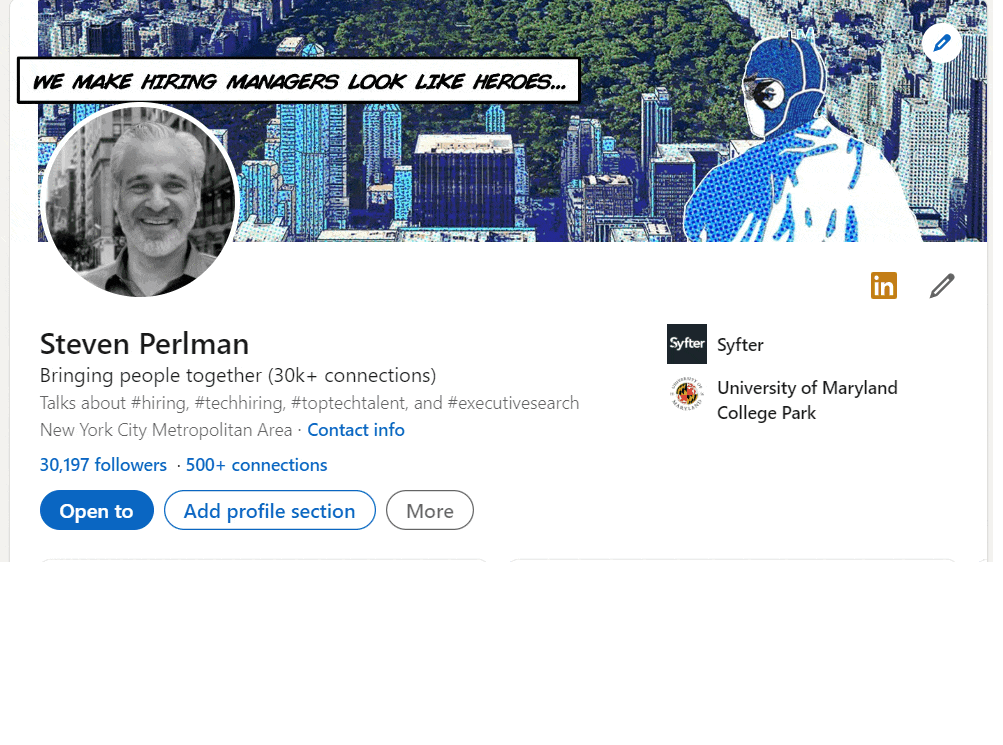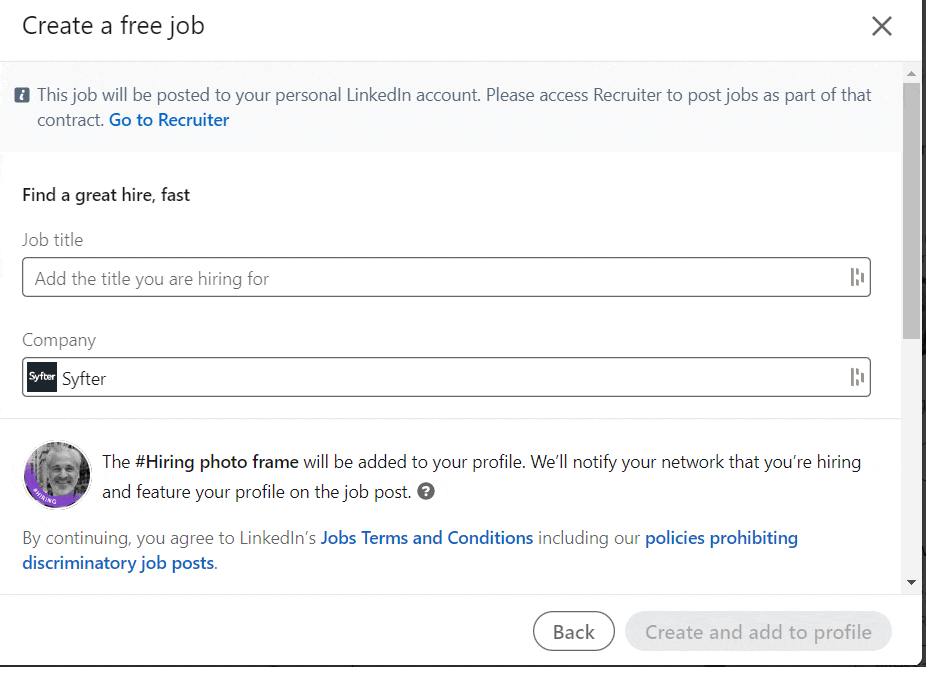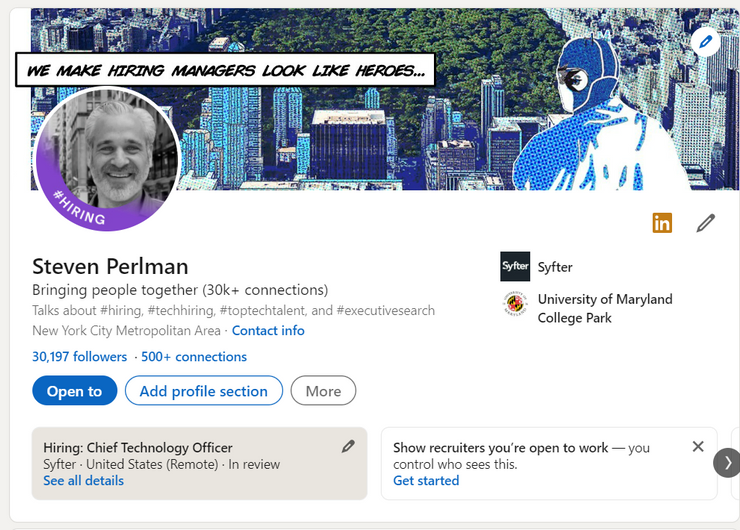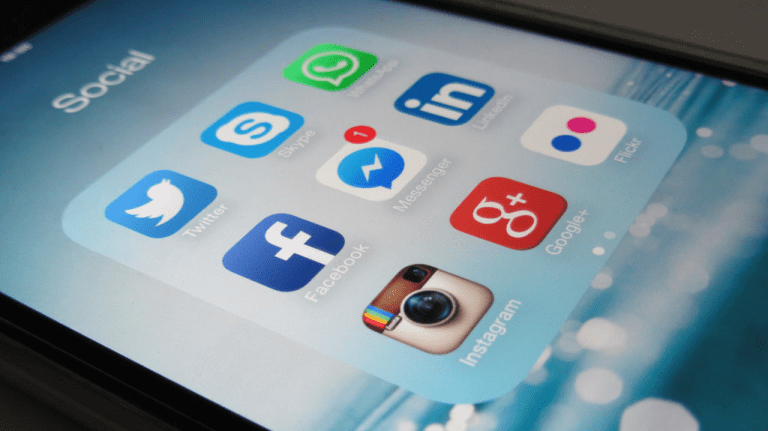By
Using AI job search tools can help optimize the hunt—and get you hired. Here’s how to make artificial intelligence work for you.
Sometimes, things seem to escalate quickly, and this was certainly the case with artificial intelligence (AI), which very swiftly transformed from a cool, futuristic idea to a tool that has infiltrated our daily lives. In fact, many of us use AI and don’t even realize it. When you use facial recognition to unlock your iPhone, Google Maps to navigate to your next destination or ask Alexa to play a song, that’s all AI. You might have mixed feelings about robots operating among us, but the future of AI is here—and there’s no going back. The latest technology can even help you level up your career with an AI job search.
Despite concerns about privacy and cybersecurity or whether ChatGPT will eliminate jobs, the benefits are real, and many job seekers are using AI tools to their advantage. Whether you’re considering changing careers or career cushioning, tap into the power of AI to help land your next big job.
How AI can offer opportunity in the job market
“Navigating the job market with AI remains a topic of considerable uncertainty, but also immense opportunity,” says Ozden Onder, chief people officer at Stability AI, a leading open generative AI company. “It’s true that we don’t fully know yet how AI will affect the types of jobs available in the future. But by learning and using the tools we have available now, you can set yourself apart from other candidates and find the right next step for your career.”
There’s no doubt that some jobs will become more automated and potentially disappear, but Ozden says to take advantage of the technology. “If history is our guide, then I believe it’s more accurate to say that in the future, it won’t be AI that replaces people. Instead, people who are enabled by AI will find more ways of doing interesting and creative work. AI is a net positive for the workplace and helping people achieve their fullest potential.” Here’s how to use AI to your advantage, according to our career experts.
Update your LinkedIn profile
Many hiring managers and recruiters look at your LinkedIn profile before they even look at your résumé, so it’s essential that your profile is in tip-top shape—that includes fixing common misspelled words on LinkedIn. “You really want to be sure to make a good first impression,” says Andrew McCaskill, LinkedIn career expert and creator of The Black Guy in Marketing newsletter. Use your profile to highlight every skill that can make you more discoverable to hiring managers, and if you hit mental roadblocks when trying to write about yourself, turn to AI to develop attractive headlines and “About Me” sections that you can then customize to your expertise. “Consider AI to provide a helping hand in helping you stand out,” McCaskill says.
Best AI tool: Get your creativity flowing during your AI job search with LinkedIn’s new AI-powered writing tools. To use the feature, simply open your “About” section and click “Get AI-Powered Suggestions” at the bottom of the text field.
Optimize your résumé for AI filters
Are résumé mistakes the reason why you’re not getting hired? Potentially. “Remember that many résumés are either machine-read or only glanced at for 10 seconds by a recruiter,” says Onder, which means learning how to optimize your résumé for AI is essential.
Bridget Lohrius, founder and CEO of career coaching company Sandwina, says that 98% of Fortune 500 companies use an applicant tracking system (ATS), which means if the key skills aren’t included in your résumé, you don’t make it through the system. “[That means] never getting the chance to dazzle a human being,” she says, adding that it’s estimated these systems reject 75% of résumés before a recruiter ever sees them.
Don’t use intricate Canva templates to build your résumé (they tend to be riddled with unique graphics, icons and fonts), and never include a photo, because ATS programs can’t read them, Lohrius says. “A clean, basic text-only design is best.”
Best AI tool: Lohrius recommends Jobscan for résumé optimization. Their proprietary AI technology analyzes your résumé and compares it with the job listing.
Find the right fit
It’s not just about finding a great job with a terrific compensation package, it’s about finding the right job that suits your skill set and your personality. “Landing a job that makes you miserable is often worse than not getting the job in the first place,” says William Vanderbloemen, founder and CEO of executive staffing company Vanderbloemen Search Group. “If you know a bit about yourself, then you can match yourself with the right job using AI.”
For example, Vanderbloemen knows he’s an Enneagram 7, so he asked an AI assistance bot, such as ChatGPT, “What are ideal jobs for an Enneagram 7?” He learned that career paths that may align well with the traits of an Enneagram 7 include photographer, event planner and sales representative. Your AI job search is only as good as your curiosity about yourself.
Best AI tool: Vanderbloemen recommends ChatGPT to help find the right fit. Simply type in your question or prompt in the message box on the ChatGPT home page. Once you receive a response, you can ask it to elaborate, regenerate a new response or more responses, or take it as it is.
Learn about company culture
There’s finding the right job, and then there’s finding a workplace culture to match your needs. Use AI job search tools to learn more about the company you’re interested in. For example, Vanderbloemen asked ChatGPT about the company culture at Google and which personality types might thrive there. He found out that Google, like many large tech companies, values a diverse workforce with a wide range of skills and personalities.
“There is no single personality type that thrives at Google, as they look for individuals who can contribute to a collaborative and innovative work environment,” Vanderbloemen says. “However, some common traits and characteristics that may be well suited for working at Google include creativity, adaptability and analytical thinking. Google is known for its data-driven approach to decision making, so individuals who are comfortable with analysing data and drawing insights from it can be successful,” he says.
Best AI tool: Vanderbloemen recommends ChatGPT to help with researching company culture.
Personalize cover letters
The job search process can be tedious and repetitive, but personalizing cover letters and creating industry-specific résumés is vital. To help your time management during the job search, tap AI to create an outline for your cover letters. “AI can save you time during that process by creating first drafts or formatting templates, so you don’t have to worry about the busywork,” says Akhila Satish, an award-winning career expert, scientist and CEO of Meseekna. Just make sure you’re personalizing and reviewing any content before submitting an application—not only will hiring managers notice AI-generated cover letters, AI can make some funny mistakes.
Lohrius points out that the cover letter is an opportunity to showcase your personality, your legitimate interest in a role or company, your understanding of their business and above all, how you—and only you—are the best fit. “AI can do the heavy lifting for you, but the most important thing to remember when using AI is that the technology generates a basic letter, so you don’t have to start from scratch, but you still need to dedicate time and energy into the content and voice to make your letter an interview-grabbing magnet,” she says.
Best AI tool: Satish recommends ChatGPT to help organize cover letter structure before you personalize it with your own voice. Lohrius likes the cover letter feature on ResumeGenius. “It takes the user through a series of questions to customize the cover letter, making the process simple and straightforward,” she says. “Once the questionnaire is completed, you add some personal information and a bit about the job you’re applying for, and the cover letter builder gets to work, creating a solid letter that you can then customize to sound like you.”
Identify the best interview questions
It’s important to remember that when interviewing, you have the best chance to ask questions about the job and the company, and you can use AI to identify the best inverview questions to ask. “After interviewing over 30,000 top candidates at Vanderbloemen, we are convinced that candidates who ask the best questions often gain the winning advantage in landing the job,” Vanderbloemen says.
As an experiment, he asked ChatGPT “What are the best questions to ask when interviewing for an ER nursing job?” A list popped up right away, he says, and included questions about the nurse-to-patient ratio in the ER and how it changes during peak times; how the hospital supports continuing education and professional development for ER nurses; what team dynamics and collaboration among ER staff looks like; and how the hospital manages the influx of patients during its busiest times.
Best AI tool: ChatGPT is a good choice here for your AI job search, but McCaskill also suggests LinkedIn’s Interview Prep tools that help prepare you for commonly asked interview questions with videos of tips and sample responses from real hiring managers and recruiters. “You can also get instant AI-powered feedback to your recorded interview practice session on pacing, how many times you’re using filler words and sensitive phrases to avoid,” McCaskill says.
Stay ahead of the AI curve
No matter your industry, staying ahead of emerging technology can help you stand out. Currently, that’s voice technology. “Voice technology is a rapidly growing field that focuses on natural interactions between humans and machines, requiring employees with highly specialized skills,” says Tobias Dengel, author of The Sound of the Future: The Coming Age of Voice Technology.
“As popularity increases in many industries, such as health care, customer service, e-commerce, financial services, education and automotive, employees with voice technology experience can stand out from other candidates, position themselves as valuable assets and demonstrate the ability to learn and adapt to emerging technologies and industry trends.”
Best AI tool: Ozden recommends Ben’s Bites, which is an excellent daily summary and essential reading on what’s trending in AI.
Create a website
Satish recommends supplementing your résumé and job application with a personal website to boost your AI job search success. “Your résumé is only a snapshot of you as a candidate, so showcasing examples of your best work and sharing more details on your bio can help you stand out in a pool of applications,” she says. Because building a website can take a lot of time and experience, she recommends AI website-building tools to help streamline the process. “That technology will help you navigate the nuances of website building so that you can focus on fine-tuning and polishing before sending it off to a potential job lead.”
Best AI tool: SquareSpace, Wix and web.com are all user-friendly website builders that use AI.
Show that you’ve done your research
Tailor your interview answers based on knowledge about the company. To get that information, use AI for research. “Interviewers love to see that candidates have done their homework,” Vanderbloemen says. He asked ChatGPT, “What are the traits of the best young analysts at Deloitte?” and he learned that strong analytical skills, technical proficiency and problem-solving ability are all traits that Deloitte looks for in its analysts. With this info, alter your answers accordingly.
Interviewing for a job in a new city? “AI can give you a trove of local knowledge you can drop in your interview to show your interest in the job,” says Vanderbloemen. Doing this shows your interest in relocating and that you’re already looking for ways to fit into the local culture. You might even reference local universities, sports teams or museums.
Best AI tool: ChatGPT is a great AI tool for this research. If you’re not sure it works on a local level, use the town you’re in now and see how accurate it is.
Experiment with AI tools
Unless you’re fresh out of college, most of us are just now learning to implement AI job search strategies. But Ozden recommends familiarizing yourself with the tools, even job search. “Experimentation is the best way to get comfortable with AI tools,” he says. Learning by doing is the best way to pick up any new skill, after all.
“We are just getting started with this new world of AI, and you should take time to learn every modality of AI—there is a lot more to AI than language models like ChatGPT,” Ozden says. We now have image, video, audio and so many other areas for experimentation.
Best AI tool: If you want to move beyond ChatGPT, Dengel suggests expanding your skill set to SDXL, which is AI image generation, especially if you’re in the creative fields or you ever need to present.
About the experts
- Ozden Onder is the chief people officer at Stability AI, a leading open generative AI company.
- Andrew McCaskill is a LinkedIn career expert and creator of The Black Guy in Marketing newsletter.
- William Vanderbloemen is the author of Be the Unicorn: 12 Data-Driven Habits That Separate the Best Leaders from the Rest. He is also the founder and CEO of Vanderbloemen Search Group.
- Tobias Dengel is the author of The Sound of the Future: The Coming Age of Voice Technology. He is president of WillowTree, a leader in digital product design and development. Dengel understands the wide-ranging implications voice technology will have for every industry, and he counsels leaders and employees on adaptation. He has worked with T. Mobile, Mastercard, Capital One and more on their voice interfaces.
- Bridget Lohrius is the founder and CEO of career coaching company Sandwina, a platform built to close the gender gap faster by making career coaching more affordable and accessible for all women.
- Akhila Satish is an award-winning career expert, scientist and CEO of Meseekna, where she works to assess and improve employee performance. Satish has worked with employers including the U.S. Department of Defense, NASA, Eli Lilly and Credit Suisse, and her work has been featured in publications such as Forbes and The Wall Street Journal.
Sources:
- New York Times: “The New ChatGPT Can ‘See’ and ‘Talk.’ Here’s What It’s Like.”
- LinkedIn: “LinkedIn’s new AI tool will help you write posts: ChatGPT Impact”
- Jobscan: “Optimize your resume to get more interviews”
- Resume Genius: “Make Your Professional Resume in Minutes”
- Ben’s Bites: “What’s trending in AI”
Feature Image Credit:
By
Jaime Alexis Stathis writes about health, wellness, technology, nutrition, careers and everything related to being a human being on a constantly evolving planet. In addition to Reader’s Digest and The Healthy, her work has been published in Self, Wired, Parade, Bon Appétit, The Independent, Women’s Health, HuffPost and more. She is also a licensed massage therapist. Jaime is working on a novel about a heroine who saves herself and a memoir about caring for her grandmother through the dark stages of dementia.












